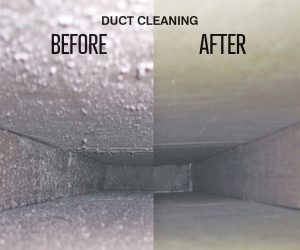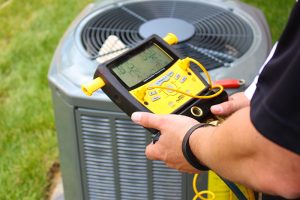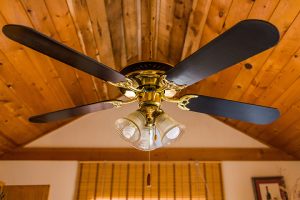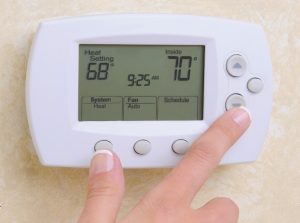Alternative Fuel Types: A Comparison
 The three most common types of home heating fuels in Greensboro are natural gas, propane, and oil. You may not give much thought to which fuel your home uses. Most likely you have continued to use whatever fuel your home was equipped with when you moved in. But maybe you’ve been wondering if there is a better way to heat your home. Maybe you’re looking at new homes or building a custom home and have the opportunity to choose. Maybe your furnace has died and needs to be replaced. Whatever the reason, consider this comparison between home heating fuels to help you make your decision.
The three most common types of home heating fuels in Greensboro are natural gas, propane, and oil. You may not give much thought to which fuel your home uses. Most likely you have continued to use whatever fuel your home was equipped with when you moved in. But maybe you’ve been wondering if there is a better way to heat your home. Maybe you’re looking at new homes or building a custom home and have the opportunity to choose. Maybe your furnace has died and needs to be replaced. Whatever the reason, consider this comparison between home heating fuels to help you make your decision.
- Propane: Propane offers a radiating warmth on cold days. And while it is perceived to cost more than natural gas, that is not always the case. One advantage of propane is that it can be delivered to any location. So, if your home doesn’t have access to natural gas, propane is a worthy alternative. You have your choice of suppliers from a few different options in most areas. Propane can also power other appliances besides your furnace. Your range, dryer, water heater, generator, and even some other appliances can run on propane, which could save you money. And you’ll still be able to cook and take hot showers if the power goes out.
- Oil: Homeowners who use oil enjoy the cozy warmth it offers on cold winter days. While heating oil tends to get a bad rap because the cost seems to be higher than other fuels, the important cost factor to remember is that it burns hotter and heats faster. This means you get more heat out of a smaller amount of oil. You won’t use as much oil as you would propane or gas in the same amount of time. It may seem pricey when you fill your tank, but rest assured you won’t need deliveries as often. You also have a choice of suppliers in your area.
Berico Offers Reliable Delivery of Heating Fuels in Greensboro
If you like the benefits of alternative heating fuels such as propane or oil, Berico is a top supplier of heating fuels in Greensboro and beyond. Berico offers regular delivery agreements that can save you money on fuel, especially when combined with furnace maintenance. Call (336) 273-8663 for more information about home heating fuels and a Comfort and Protection Service Agreement from Berico.


 When was the last time you had your central air ducts cleaned? If the answer is “never” or “I don’t remember” then it’s way past due. Duct cleaning should be done periodically as part of regular HVAC maintenance. The frequency depends on a number of factors including whether you have pets, where you live, and the number of people living in your home. You should certainly be sure to have it done as part of an AC replacement in Reidsville. If you’re contemplating having your ducts cleaned, be sure to consider these top 5 reasons to have it done.
When was the last time you had your central air ducts cleaned? If the answer is “never” or “I don’t remember” then it’s way past due. Duct cleaning should be done periodically as part of regular HVAC maintenance. The frequency depends on a number of factors including whether you have pets, where you live, and the number of people living in your home. You should certainly be sure to have it done as part of an AC replacement in Reidsville. If you’re contemplating having your ducts cleaned, be sure to consider these top 5 reasons to have it done. Is your air conditioner failing to keep your home cool? Usually, you will first notice that your AC is running constantly but not getting down to the temperature you’ve set on your thermostat. When you go outside and check the outdoor unit, you find ice, which seems odd on a hot summer day. It is odd, and it means that your air conditioner is not working properly. It’s time to call for
Is your air conditioner failing to keep your home cool? Usually, you will first notice that your AC is running constantly but not getting down to the temperature you’ve set on your thermostat. When you go outside and check the outdoor unit, you find ice, which seems odd on a hot summer day. It is odd, and it means that your air conditioner is not working properly. It’s time to call for  One of the most important parts of your HVAC system is the least expensive. Disposable filters make it easy and affordable to change your filters regularly. Bi-annual maintenance typically includes filter replacement, but changing your filters yourself quarterly or even monthly helps to keep more allergens out of the air and keeps your system running efficiently to prevent expensive
One of the most important parts of your HVAC system is the least expensive. Disposable filters make it easy and affordable to change your filters regularly. Bi-annual maintenance typically includes filter replacement, but changing your filters yourself quarterly or even monthly helps to keep more allergens out of the air and keeps your system running efficiently to prevent expensive  Going green can have many meanings. Some people are simply trying to save a little energy. Others want to lessen their overall carbon footprint on the earth. Whatever your green goals are, your HVAC system is a great place to start. Heating and cooling make up about half of the total energy used by the average American household. What if you could reduce that number by half? Imagine what a difference that would make to the earth and to your budget. Here’s what may surprise you: one of the easiest things you can do to reduce the amount of energy your HVAC system uses is to schedule yearly maintenance on your HVAC system. Not only will this help conserve energy, but it will also help keep your system running smoothly and alleviate the need for full-blown
Going green can have many meanings. Some people are simply trying to save a little energy. Others want to lessen their overall carbon footprint on the earth. Whatever your green goals are, your HVAC system is a great place to start. Heating and cooling make up about half of the total energy used by the average American household. What if you could reduce that number by half? Imagine what a difference that would make to the earth and to your budget. Here’s what may surprise you: one of the easiest things you can do to reduce the amount of energy your HVAC system uses is to schedule yearly maintenance on your HVAC system. Not only will this help conserve energy, but it will also help keep your system running smoothly and alleviate the need for full-blown  You probably know some common simple ways to save energy in your home. You likely make a point to turn off the lights when you leave a room. But there are many other small steps you can take that will save you a lot of money on your energy bill. Many of these tips are related to your HVAC service in Greensboro. Give these tips a try this summer and see how much you can save.
You probably know some common simple ways to save energy in your home. You likely make a point to turn off the lights when you leave a room. But there are many other small steps you can take that will save you a lot of money on your energy bill. Many of these tips are related to your HVAC service in Greensboro. Give these tips a try this summer and see how much you can save. When your air conditioner completely stops working, it’s obvious that it needs repair. But there are some more subtle signs that you need HVAC service in Burlington. These signs may be less noticeable, but catching them early can mean the difference between an easy repair and complete system replacement. Be on the lookout for the three “U”s of HVAC symptoms.
When your air conditioner completely stops working, it’s obvious that it needs repair. But there are some more subtle signs that you need HVAC service in Burlington. These signs may be less noticeable, but catching them early can mean the difference between an easy repair and complete system replacement. Be on the lookout for the three “U”s of HVAC symptoms.
 Your energy bill is a necessary expense, but you can lower it with just a few minor changes. One major key to energy savings is your thermostat. Your thermostat settings play a big part in keeping your HVAC system running as efficiently as possible. You should always have your thermostat checked yearly as part of your regular maintenance schedule in order to keep your system running at peak performance and prevent expensive AC repair in Reidsville.
Your energy bill is a necessary expense, but you can lower it with just a few minor changes. One major key to energy savings is your thermostat. Your thermostat settings play a big part in keeping your HVAC system running as efficiently as possible. You should always have your thermostat checked yearly as part of your regular maintenance schedule in order to keep your system running at peak performance and prevent expensive AC repair in Reidsville.